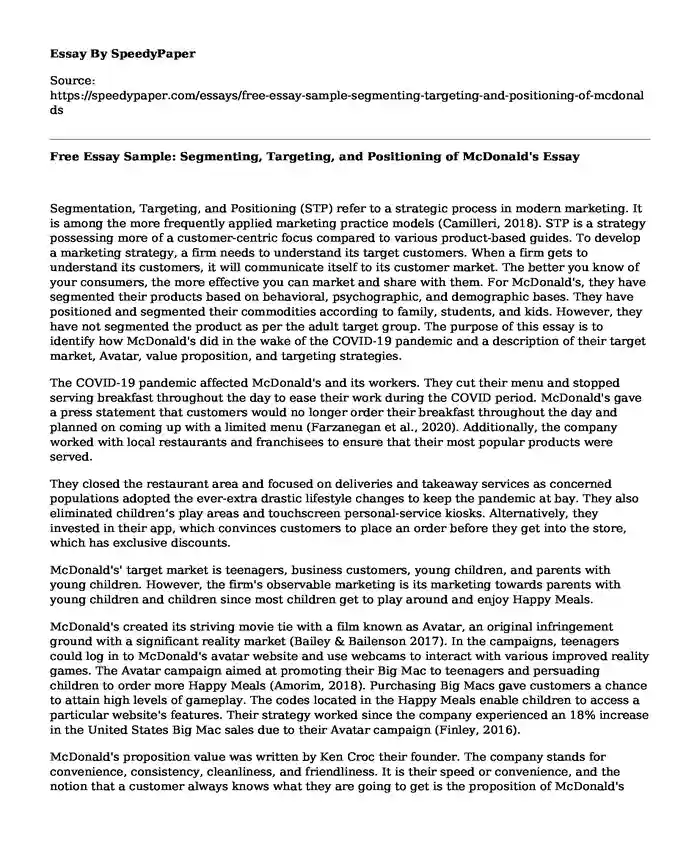Segmentation, Targeting, and Positioning (STP) refer to a strategic process in modern marketing. It is among the more frequently applied marketing practice models (Camilleri, 2018). STP is a strategy possessing more of a customer-centric focus compared to various product-based guides. To develop a marketing strategy, a firm needs to understand its target customers. When a firm gets to understand its customers, it will communicate itself to its customer market. The better you know of your consumers, the more effective you can market and share with them. For McDonald's, they have segmented their products based on behavioral, psychographic, and demographic bases. They have positioned and segmented their commodities according to family, students, and kids. However, they have not segmented the product as per the adult target group. The purpose of this essay is to identify how McDonald's did in the wake of the COVID-19 pandemic and a description of their target market, Avatar, value proposition, and targeting strategies.
The COVID-19 pandemic affected McDonald's and its workers. They cut their menu and stopped serving breakfast throughout the day to ease their work during the COVID period. McDonald's gave a press statement that customers would no longer order their breakfast throughout the day and planned on coming up with a limited menu (Farzanegan et al., 2020). Additionally, the company worked with local restaurants and franchisees to ensure that their most popular products were served.
They closed the restaurant area and focused on deliveries and takeaway services as concerned populations adopted the ever-extra drastic lifestyle changes to keep the pandemic at bay. They also eliminated children’s play areas and touchscreen personal-service kiosks. Alternatively, they invested in their app, which convinces customers to place an order before they get into the store, which has exclusive discounts.
McDonald's' target market is teenagers, business customers, young children, and parents with young children. However, the firm's observable marketing is its marketing towards parents with young children and children since most children get to play around and enjoy Happy Meals.
McDonald's created its striving movie tie with a film known as Avatar, an original infringement ground with a significant reality market (Bailey & Bailenson 2017). In the campaigns, teenagers could log in to McDonald's avatar website and use webcams to interact with various improved reality games. The Avatar campaign aimed at promoting their Big Mac to teenagers and persuading children to order more Happy Meals (Amorim, 2018). Purchasing Big Macs gave customers a chance to attain high levels of gameplay. The codes located in the Happy Meals enable children to access a particular website's features. Their strategy worked since the company experienced an 18% increase in the United States Big Mac sales due to their Avatar campaign (Finley, 2016).
McDonald's proposition value was written by Ken Croc their founder. The company stands for convenience, consistency, cleanliness, and friendliness. It is their speed or convenience, and the notion that a customer always knows what they are going to get is the proposition of McDonald's value.
McDonald’s uses the demographic segmentation strategy with age criteria (Crawford, 2015). The company offers Happy Meal like free toys for children. Additionally, they have made their environment appropriate for drive-thru and takeaways for several families. Students might also choose to have lunch and hang out at McDonald's.
References
Amorim, I. D. D. S. P. D. (2018). Experiencing ar in retail: the influence of moment marketing and avatars on consumer behavior (Doctoral dissertation).
Bailey, J. O., & Bailenson, J. N. (2017). Considering virtual reality in children’s lives. Journal of Children and Media, 11(1), 107-113.
Camilleri, M. A. (2018). Market segmentation, targeting, and positioning. In Travel marketing, tourism economics, and the airline product (pp. 69-83). Springer, Cham.
Crawford, A. (2015). McDonald's: A case study in glocalization. Journal of Global Business Issues, 9(1), 11.
Farzanegan, M. R., Feizi, M., & Gholipour, H. F. (2020). Globalization and outbreak of COVID-19: An empirical analysis.
Finley, N. G. (2016). An Evaluation of the Effectiveness of Avatar Marketing on a Firm's Financial Performance. Hampton University.
Cite this page
Free Essay Sample: Segmenting, Targeting, and Positioning of McDonald's. (2024, Jan 04). Retrieved from https://speedypaper.net/essays/free-essay-sample-segmenting-targeting-and-positioning-of-mcdonalds
Request Removal
If you are the original author of this essay and no longer wish to have it published on the SpeedyPaper website, please click below to request its removal:
- Free Essay: Strategic Management Exam Questions and Answers
- Travel Essay Sample: Changes, Cancellation, and Penalty
- Report Planning for Walmart Company, Free Paper Sample for Students
- Free Essay - Walt Disney Analysis
- Free Essay: Analysis of Malaysian and Singaporean Domino Pizza Advertisements
- Paper Example. Brick and Mortar Outlets
- Essay Sample on Progress, Results, and Finalizing the HR Project
Popular categories





